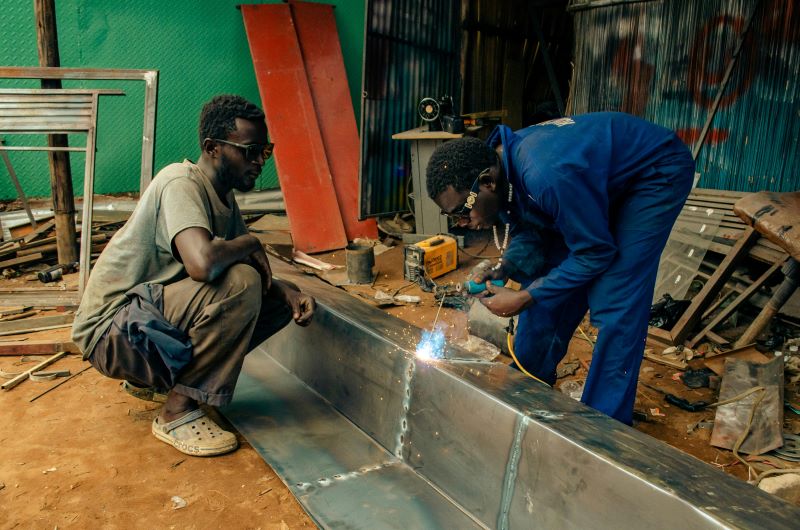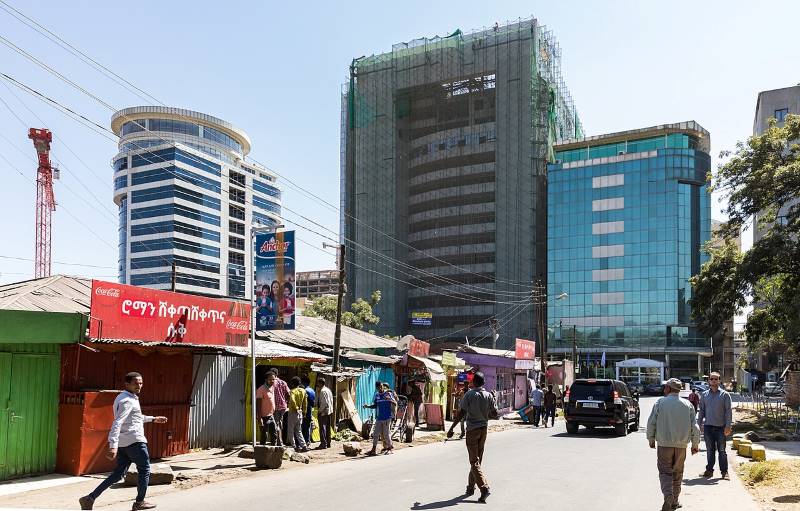Photo by Shakur Leni
Africa is in need of economic growth. With an increasing youth population, expanding urbanization, an ever-evolving technological advancement and the urgent need to drive productivity through innovation and industrialization that positively impact on its Gross Domestic Product output, one of Africa’s answers lies in developing its local manufacturing capacity.
In the Southeastern part of Nigeria, one state is taking the initiative of leading the vanguard of Africa’s hub for innovation in local manufacturing. Whether it is in textile, cosmetics, various forms of steel fabrications, as well as the conversion of leather products into shoes and bags, the city of Aba in Abia State is making waves as an industrial and commercial centre not only in Nigeria but in Africa as well.
Popularly referred to as “Made-In-Aba,” an expression associated with products coming from the city, the growing number of entrepreneurs producing at small and large scales continues to reinforce the fact that unlocking the manufacturing possibilities in Africa as a means of driving industrialization is crucial in achieving remarkable growth and development for Africa.
Made-In-Aba, A Hub for African Craftsmanship and Innovation
Aba, a significant manufacturing hub in Nigeria, had once been dismissed as a location for where products of inferior quality were made. Local manufacturers within the city were commonly accused of producing copies of international brands as an alternative option to consumers whose purchasing power could neither afford the luxury brands nor the quantity desired.
Successive governments both at federal and state level would later realize the enormous potential of the city as an industrial centre and begin to churn out programs that afforded local manufacturers the opportunity to upskill as well as grant them access to finance for the purchase of critical machinery as a way of boosting the manufacturing sector of the city.
Institutions like the Bank of Industry had led the charge in providing short term financing for interested manufacturers. As pointed out in a report by the Nigerian Investment Promotion Council, it noted that the “BoI unveiled its new innovative product, Cluster Financing of small and medium industries in the manufacturing sector. The bank propped up no fewer than 70,000 artisans engaged in the leather products business. Each the Leather Products Manufacturers Association of Abia State, LEPMAAS would receive short-term loans, between N300,000 and N500,000.”(nipc.gov.ng)
More initiatives to drive training and capacity development, improve infrastructure, facilitate the sourcing of quality materials, ensure automation by providing manufacturing technologies as well as eliminating counterfeiting practices while raising the quality standards through the support of institutions like the Standard Organization of Nigeria is continually revolutionizing Aba’s industrial hub and making it meet both the local and growing market of Africa.
Driving Manufacturing Ingenuity for Economic Growth in Africa
In its effort to draw up a blueprint for the industrialization of Africa, the African Union created the “Agenda 2063” which is a “master plan for transforming Africa into the global powerhouse of the future. It is the continent’s strategic framework that aims to deliver on its goal for inclusive and sustainable development and is a concrete manifestation of the pan-African drive for unity, self-determination, freedom, progress, and collective prosperity”. (au.int)
Part of its core focus is to drive socio-economic growth and development through the manufacturing sectors. As pointed out by the African Union Development Agency in its 2023 article titled – Unlocking Africa’s Potential Through Enhancing The Continent’s Industrialisation Sector, it states that “Agenda 2063 recognizes industrialization as a crucial driver for achieving sustainable development, competitiveness, recovery, resilience, and inclusive prosperity in Africa.
It seeks to transform Africa’s economies from primarily relying on the export of raw materials to value-added production, manufacturing, and services. Therefore, by developing a robust industrial sector, the African Union aims to support Member States to create jobs, enhance productivity, increase incomes, and reduce poverty across the continent”. (nepad.org).
Potential for Africa’s economic growth continues to lie in embracing local manufacturing as a way of stimulating economic growth beyond conversations at various summits and conventions into real-life instances that directly address challenges of unemployment, the need for economic diversification and sustainability and reducing over-dependence on foreign products to meet its economic needs.
By driving local manufacturing ingenuity, African countries can leverage initiatives like the African Continental Free Trade Area (AfCFTA) which aims at strengthening the economic integration of Africa by providing member countries with a single market for goods and services through the creation of the largest free trade area.
Other benefits to derive from pursuing local manufacturing ingenuity are visible in the capacity of African countries to achieve its sustainable development goals (SDG’s), achieving technological advancement through automation and digitalization, realizing its economic diversification as well as remaining a major player in the global market.
Using the “Made-in-Aba” model of promoting local ingenuity, African nations can achieve their economic independence by embracing innovation and industrialization to produce goods and services for Africans, by Africans.

Okechukwu Nzeribe works with the Onitsha Chamber of Commerce, in Anambra State, Nigeria, and loves unveiling the richness of African cultures. okechukwu.onicima@gmail.com





